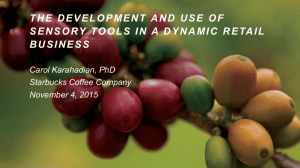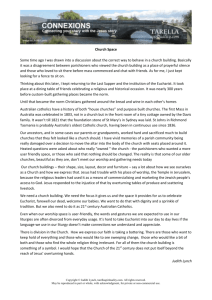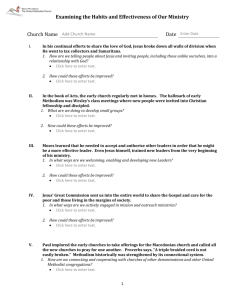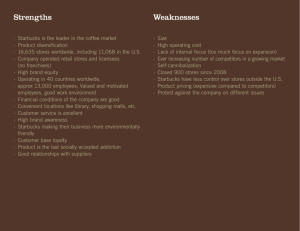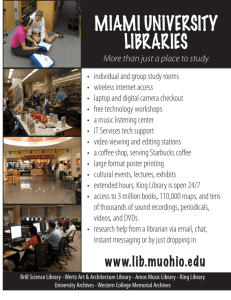140923_general.presbyter.report.
advertisement
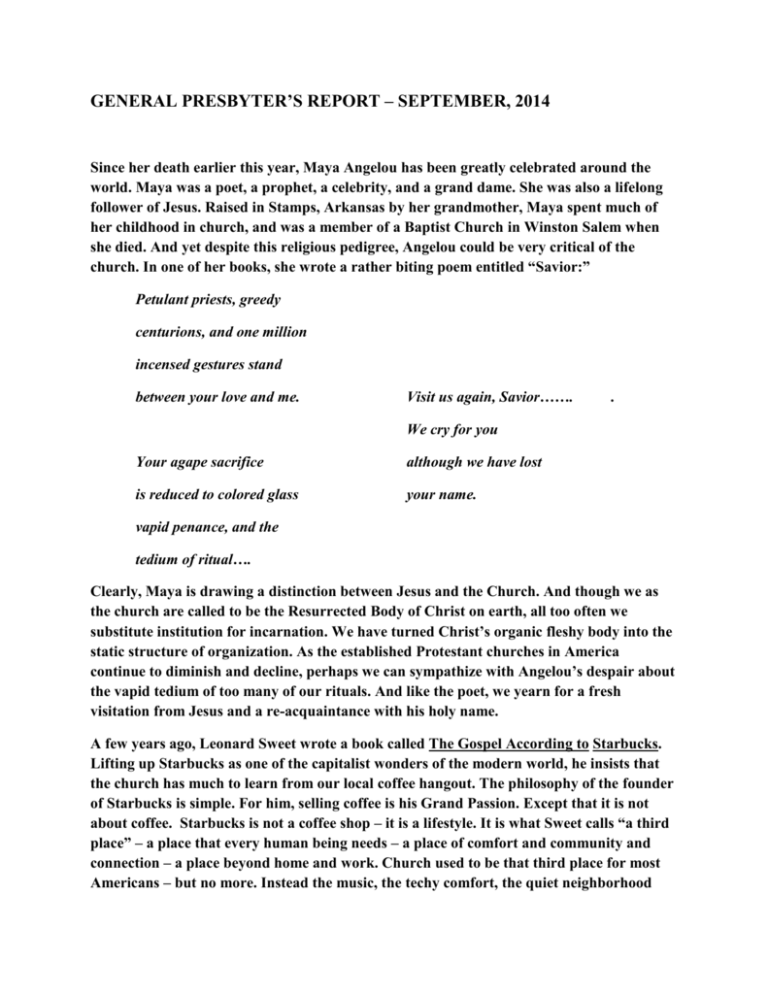
GENERAL PRESBYTER’S REPORT – SEPTEMBER, 2014 Since her death earlier this year, Maya Angelou has been greatly celebrated around the world. Maya was a poet, a prophet, a celebrity, and a grand dame. She was also a lifelong follower of Jesus. Raised in Stamps, Arkansas by her grandmother, Maya spent much of her childhood in church, and was a member of a Baptist Church in Winston Salem when she died. And yet despite this religious pedigree, Angelou could be very critical of the church. In one of her books, she wrote a rather biting poem entitled “Savior:” Petulant priests, greedy centurions, and one million incensed gestures stand between your love and me. Visit us again, Savior……. . We cry for you Your agape sacrifice although we have lost is reduced to colored glass your name. vapid penance, and the tedium of ritual…. Clearly, Maya is drawing a distinction between Jesus and the Church. And though we as the church are called to be the Resurrected Body of Christ on earth, all too often we substitute institution for incarnation. We have turned Christ’s organic fleshy body into the static structure of organization. As the established Protestant churches in America continue to diminish and decline, perhaps we can sympathize with Angelou’s despair about the vapid tedium of too many of our rituals. And like the poet, we yearn for a fresh visitation from Jesus and a re-acquaintance with his holy name. A few years ago, Leonard Sweet wrote a book called The Gospel According to Starbucks. Lifting up Starbucks as one of the capitalist wonders of the modern world, he insists that the church has much to learn from our local coffee hangout. The philosophy of the founder of Starbucks is simple. For him, selling coffee is his Grand Passion. Except that it is not about coffee. Starbucks is not a coffee shop – it is a lifestyle. It is what Sweet calls “a third place” – a place that every human being needs – a place of comfort and community and connection – a place beyond home and work. Church used to be that third place for most Americans – but no more. Instead the music, the techy comfort, the quiet neighborhood hub bub of the local coffee shop has become a place where strangers become friends. And, Sweet suggests, if Jesus showed up tomorrow, he would be more comfortable in Starbucks than in most of our churches. Riffing off this Starbucks image, I want to agree with Maya Angelou that we need Jesus to visit us again. And we need to recover the radical, rich, and real power that the Living Christ offers us inside the church and out. Rather than a bland buddy or pious preacher, the Jesus we meet in scripture is more of a bold barista - preparing the unique jolt of spiritual caffeine each of us needs to live our lives fully. And what the church at its best can offer us is not comfort and complacency, but commitment, connection, and conviction. If we wander through the Gospel pages with this bold barista Jesus, what we discover is caffeine for the soul – much at odds with the watered down brew of the conventional world. Love enemies. Don’t hurt them. Focus on the poor, and let the rich fend for themselves. Touch lepers, don’t shun them. Invite women into the community of discipleship. Let the little children come, and bless them with all their noise and energy and interruptions. Honor the authority of Caesar, but only give your true allegiance to God. Suffer willingly in order to bring healing to others. And don’t be scared of death. For it is only when a seed dies that healthy grain can grow. Not only does Jesus turn religious wisdom on its ear. He turns living wisdom on its ear. And if we want to be his disciples – disciples of this bold barista of rich, hot, caffeinated faith - then we need to turn the wisdom of our contemporary world on its ear, too. In trying to infuse the church with the best learnings from the Starbucks strategy, Len Sweet has come up with the anagram E-P-I-C. EPIC. And he suggests that vital churches in the 21st century must be EPIC churches. E stands for experiential. None of the disciples in scripture understood faith until they did it. We Presbyterians think too much – and experience too little. Instead of thinking about prayer – why don’t we just pray? Instead of wishing that we had more children in our pews or more people of color in our congregation, why not go out and find them and invite them and welcome them? Any educator will tell you that children learn by doing, not by listening. We must experience our faith first – and then we will discover what we really believe. P stands for participatory. Despite the cultural lure of finding our “individual bliss,” Jesus makes it clear that we can’t be Christians by ourselves. By definition, the church is a community of partnership and participation. One good trend in Presbyterian worship is the rise in participation of all the people in the pews. As Kierkegaard so aptly suggested, in Christian Worship – the “audience” is God – and we you and I are the actors – all of us playing the various parts in acting out the drama of scripture. Rather than listening to a concert, we are all called to make music – to sing, to clap occasionally, to feel the Gospel in our bones and our blood. More and more of our churches are encouraging weekly communion – and often by intinction – people actually getting up and walking forward – offering ourselves to God as we are fed with the Bread and Life and the Cup of Blessing. And in growing family congregations, children are more and more an active part of worship – participating in the liturgy, playing instruments, pouring water, blowing bubbles - and not just restlessly waiting to be released for Sunday School. Friends, if we participate – if each one of has a chance to act out the various parts of worship – then it becomes part of our bodies and our souls – and not just passive entertainment for our minds. I stands for image rich. Images, metaphors, stories, visual art, banners, colors, water, bread, wine, instruments, dance, poetry, video clips. More and more worship and education is becoming a goldmine for the senses and the imagination. After all, God cannot be fully captured by words or doctrines. Jesus is a person, not an idea. And the more we play with images, the more the Spirit can fertilize our hearts. Finally, C is for Connection. Not just the “friendly” connections at Coffee Hour but the more intimate connections of heart to heart relationships. Of taking off our masks. Of trusting that our brothers and sisters in Christ want to know us – really know us – and that we can trust both our joys and our sorrow, our successes and our failures into each other’s keeping. In addition , a truly connected church is one who is not just bound together with those inside these walls – but also bound together with the people outside these walls – our neighbors, those who are different, those who are in need. One of the enduring images for me from those tumultuous weeks in Ferguson, Missouri in August was the picture of 100 volunteers from five local churches who banded together to reach out to their community. The morning after the first night of rioting, they arrived outside the looted stores to clean up the glass, to reach out to the protestors, to serve coffee and donuts - to get to know their neighbors. They made a connection with strangers in order to become friends. It was EPIC in a nutshell. EPIC – EXPERIENTIAL, PARTICPATORY, IMAGE RICH, CONNECTED - a caffeinated. committed, community of disciples – trusting, playing, risking – all to the glory of God. Dear friends, this is my dream for our presbytery – our community of Presbyterian congregations - as we move forward. To paraphrase a blessing we received on our wedding day almost 40 years ago: May our journey together be as comfortable as an old shoe, and as mysterious as a Chinese puzzle. May it be so. Amen. Susan Andrews
